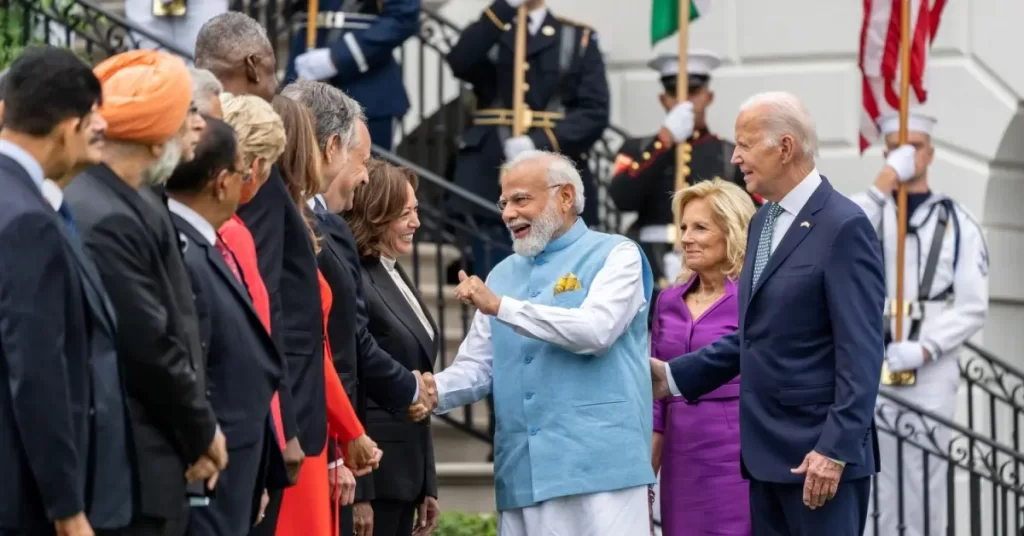President Joe Biden and congressional leaders are rolling out the red carpet for Indian Prime Minister Narendra Modi as he embarks on an official state visit to the United States. This significant diplomatic occasion includes an address to a joint session of Congress and an elaborate White House state dinner, typically reserved for close allies. Despite concerns over Modi’s right-wing populist agenda, the strategic importance of the U.S.-India relationship in countering China’s influence appears to be driving the warm reception.
Efforts to strengthen ties between the two countries have been underway, spearheaded by the bipartisan U.S.-India Political Action Committee (USINPAC) and Modi’s political allies in Washington. Lobbying activities have focused on highlighting India’s position as the sole democracy in the region and emphasizing the need for a robust U.S.-India partnership in the face of China’s growing power. These efforts have yielded invitations for Modi to address Congress and partake in a state dinner hosted by President Biden.
In addition to countering criticism of India’s human rights record, the marches organized by the American overseas arm of Modi’s Bharatiya Janata Party were aimed at bolstering his political image ahead of the upcoming general election. These demonstrations sought to project Modi as a leader of international stature, boosting his domestic standing and fostering a sense of pride among the Indian diaspora in the United States.
The timing of Modi’s visit is notable, coinciding with Secretary of State Antony Blinken’s recent discussions with senior Chinese officials in Beijing. As tensions between the U.S. and China have escalated, Washington has increasingly looked to forge closer ties with India to counter China’s political and economic influence. The special treatment accorded to Modi during his visit reflects the deepening of defense, diplomatic, and economic ties between the two countries, while acknowledging the complexities of India’s relationship with China as a significant trading partner.
Concrete outcomes are expected from the visit, including a potential deal for General Electric to manufacture jet engines in India for the country’s military aircraft. Additionally, discussions on healthcare and artificial intelligence are on the agenda, further solidifying collaboration in technology, investments, and defense between the U.S. and India.
The U.S.-India partnership is widely regarded as one of the most significant relationships of the century. Representative Ro Khanna, co-chair of the U.S.-India congressional caucus, anticipates strengthening technology and defense cooperation while promoting joint scientific research and climate change initiatives. Former South Carolina Governor Nikki Haley, a 2024 Republican presidential candidate and daughter of Indian immigrants, commends the decision to host Modi, emphasizing the shared values and interests that make India a natural ally of the United States.
However, the Biden administration and American political leaders have faced criticism for not placing stronger emphasis on concerns over press freedoms in India and the treatment of minority Muslims and Christians. Representative Khanna underscores the importance of grounding the relationship in respect for pluralism, an open internet, human rights, and liberal democracy.
In conclusion, the state visit of Prime Minister Narendra Modi highlights the strategically important U.S.-India partnership aimed at countering China’s influence. Despite reservations about Modi’s policies, the warm reception from the U.S. government underscores the shared values and interests between the two nations. Concerns over human rights and democratic principles continue to be raised, but the visit is expected to yield tangible outcomes and deepen collaboration in technology, investments, and defense. The U.S.-India partnership is increasingly recognized as one of the most significant relationships of this century.



